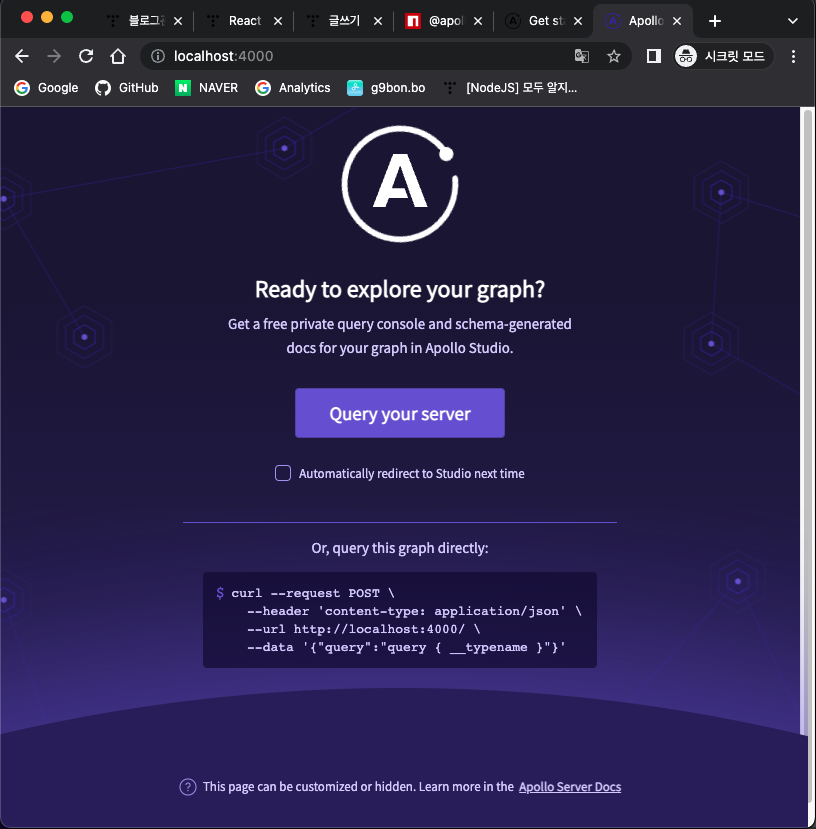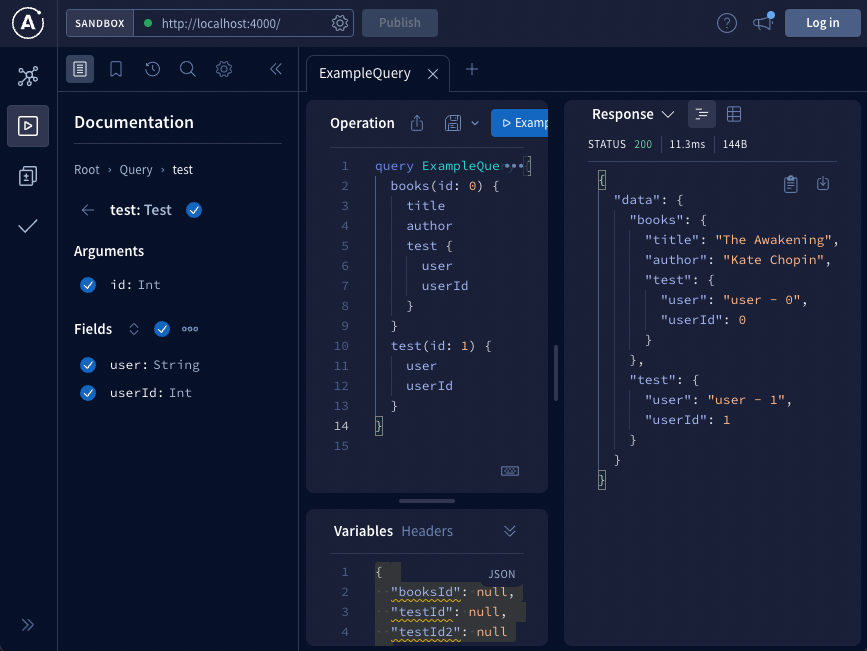| 일 | 월 | 화 | 수 | 목 | 금 | 토 |
|---|---|---|---|---|---|---|
| 1 | 2 | 3 | 4 | 5 | 6 | 7 |
| 8 | 9 | 10 | 11 | 12 | 13 | 14 |
| 15 | 16 | 17 | 18 | 19 | 20 | 21 |
| 22 | 23 | 24 | 25 | 26 | 27 | 28 |
- KakaoMap
- node
- webrtc
- html2canvas
- Flutter
- three.js
- babel
- swagger-typescript-api
- multiple camera
- hls.js
- http live streaming
- Babel standalone
- jszip
- REST API
- segment
- append row
- Redux
- typescript
- code editor
- uint16array
- uint8array
- HLS
- Prism.js
- Game js
- how to install cursor on ubuntu
- react
- M3U8
- cursor-ubuntu-installer
- localization
- Excel
- Today
- Total
Never give up
React, Node - Graphql example(feat. apollo) 본문
최근에 graphql사용하는 곳들이 생기면서 궁금해서 한번 예제를 만들어봤습니다
해당 예제는 apollo server, client로 만들었습니다
apollo-server : https://www.npmjs.com/package/apollo-server
apollo/client : https://www.npmjs.com/package/@apollo/client
먼저 노드 서버쪽을 보면
server/index.js
const ApolloServer = require('apollo-server').ApolloServer;
const resolvers = require('./resolvers/index')
const typeDefs = require('./typedefs/index')
const server = new ApolloServer({
typeDefs,
resolvers,
csrfPrevention: true,
});
server.listen().then(({ url }) => {
console.log(`🚀 Server ready at ${url}`);
});
apollo server에 typedefs, resolvers를 등록해줍니다
typedefs는 사용할 schema 및 데이터 구조를 정의하고
resolvers는 typedefs에 정의한 로직부분을 처리한다고 생각하면 될것 같습니다
server/typedefs/index.js
const gql = require('apollo-server').gql
module.exports = gql`
type Book {
title: String
author: String
test(id: Int): Test
}
type Test {
user: String
userId: Int
}
type Query {
books(id: Int): Book
test(id: Int): Test
}
`;apollo 서버 예제에 나와있는 book에서 조금 변형시켜서 한번 해봤습니다
(예제 링크 : https://www.apollographql.com/docs/apollo-server/getting-started/)
server/resolvers/index.js
const books = require('../model/book/index')
const test = require('../model/test/index')
module.exports = {
Query: {
books: (_, { id }) => {
console.log(`[books] id : ${id}`)
return {
...books[id],
test: test[id]
}
},
test: (_, args) => {
console.log(`[test] id : ${args.id}`)
return test[args.id]
}
},
}원래는 예외처리를 따로 해줘야되는데 간단한 예제만 진행할 예정이라(귀찮아서...) 일단 하지는 않았습니다
server/model/test/index.js
module.exports = Array.from({ length: 2 }, (_, i) => {
return {
user: `user - ${i}`,
userId: i
}
})server/model/book/index.js
module.exports = [
{
title: 'The Awakening',
author: 'Kate Chopin',
},
{
title: 'City of Glass',
author: 'Paul Auster',
},
];필자가 사용할 모델들은 다음과 같습니다
여기까지 진행하고 테스트 해보면

localhost port 4000으로 들어가면 다음과 같은 화면이 나옵니다
(apollo server의 default port는 4000입니다)
해당 화면으로 들어가면

쿼리 테스트할 수 있는 화면이 나옵니다
// 요청 쿼리
query ExampleQuery {
books(id: 0) {
title
author
test {
user
userId
}
}
test(id: 1) {
user
userId
}
}
// resposne
{
"data": {
"books": {
"title": "The Awakening",
"author": "Kate Chopin",
"test": {
"user": "user - 0",
"userId": 0
}
},
"test": {
"user": "user - 1",
"userId": 1
}
}
}원하는 값(id: 0, 1)을 잘 들고온것 같습니다
다음으로 react 부분을 보면
src/index.js
import { ApolloProvider } from '@apollo/client';
import React from 'react';
import ReactDOM from 'react-dom/client';
import App from './app';
import client from './client';
import reportWebVitals from './reportWebVitals';
const root = ReactDOM.createRoot(document.getElementById('root'));
root.render(
<React.StrictMode>
<ApolloProvider client={client}>
<App />
</ApolloProvider>
</React.StrictMode>
);
reportWebVitals();redux 셋팅하는것과 비슷하게 provider를 app 부모 태그로 넣어주고
client를 따로 정의해서 넣어줍니다
src/client.js
import { ApolloClient, InMemoryCache } from "@apollo/client"
export default new ApolloClient({
uri: 'http://localhost:4000',
cache: new InMemoryCache()
})기본 포트인 4000번과 rest api에서 사용하는 http 캐싱 방법과 다른 in memory cache를 사용합니다
src/app.js
import { gql } from '@apollo/client'
import React, { useEffect, useState } from 'react'
import './app.css'
import client from './client'
import TableComponent from './components/table'
function App() {
const [value, setValue] = useState({ loading: true, data: undefined, error: undefined })
useEffect(() => {
async function init() {
const res = await client.query({
query: gql`
{
books(id: 1) {
title
author
test {
user
userId
}
}
test(id: 0) {
user
userId
}
}
`})
const loading = res.loading
let error
if (res.error || res.errors) {
error = res.error + res.errors
}
const data = res.data
setValue({ loading, error, data })
}
init()
}, [])
let component
if (value.loading) {
component = (<p className='p_detail'>Loading...</p>)
}
if (value.error) {
component = (
<div className='div_component'>
<p className='p_detail'>Error!</p>
{value.error}
</div>
)
}
if (value.data) {
const tableData = {
book: {
headList: ['Id', 'User', 'author', 'title'],
bodyList: [
value.data.books.test.userId,
value.data.books.test.user,
value.data.books.author,
value.data.books.title
]
},
test: {
headList: ['Id', 'User'],
bodyList: [
value.data.test.userId,
value.data.test.user
]
}
}
component = (<div className='div_component'>
<TableComponent headList={tableData.book.headList} bodyList={tableData.book.bodyList} />
<TableComponent headList={tableData.test.headList} bodyList={tableData.test.bodyList} />
</div>)
}
return (
<div className='div_center'>
{component}
</div>
)
}
export default Appsrc/app.css
.div_center {
width: 100%;
height: 100vh;
display: flex;
align-items: center;
justify-content: center;
}
table {
margin: 40px auto 40px auto;
box-shadow: 0 1.5px #e4e4e4;
text-align: center;
border-collapse: collapse;
box-shadow: 0 0 20px rgba(0, 0, 0, 0.15);
border-radius: 12px;
overflow: hidden;
}
table>thead {
background-color: #009879;
text-align: left;
color: white;
font-size: 14px;
}
td {
padding: 10px 20px 10px 20px;
border-bottom: 0.5px solid rgba(128, 128, 128, 0.1);
vertical-align: middle;
}
th {
padding: 10px 20px 10px 20px;
border-bottom: 0.5px solid rgba(128, 128, 128, 0.1);
vertical-align: middle;
}
src/components/table.jsx
import React from 'react'
function TableComponent(props) {
const { headList, bodyList } = props
return (
<table>
<thead>
<tr>
{headList.map((e, i) => (
<th key={`${e} - ${i}`}>
{e}
</th>
)
)}
</tr>
</thead>
<tbody>
<tr>
{bodyList.map((e, i) => (<td key={`${e} - ${i}`}>
{e}
</td>)
)}
</tr>
</tbody>
</table>
)
}
export default TableComponentclient를 이용해서 위에서 테스트한 쿼리와 그대로 만들어줬고
받은 데이터를 이용해서 table로 만들어봤습니다

쿼리부분을 따로 string으로 저장하면 조금더 깔끔한 코드가 될거 같습니다
예를들어 호출부분은 이렇게 처리하고
const res = await client.query({ query })쿼리부분은 이렇게 처리해보니
const { gql } = require("@apollo/client");
export default gql`
{
books(id: 1) {
title
author
test {
user
userId
}
}
test(id: 0) {
user
userId
}
}
`조금 더 깔끔해진것 같습니다
추가로 useQuery, useMutation등을 써보니 더 좋아보이더군요
React-query 사용할때랑 비슷한 느낌이었습니다
const { loading, error, data } = useQuery(gqlTest)
const [setIdx, { loading, error, data }] = useMutation(gqlMutation)
useEffect(() => {
setIdx({ variables: { idx: 0 } })
}, [])

(전체 소스 코드 : https://github.com/devmemory/graphql_example)
apollo client와 server를 이용해서 간단하게 만들어봤는데
해당 패키지 없이 구현하려면 난이도가 조금 높을것 같다는 생각이 들었습니다
'WEB' 카테고리의 다른 글
| React - Social login(Kakao, Naver , Facebook, Google) (18) | 2022.07.16 |
|---|---|
| React - make html element to pdf(Feat. jspdf, html2canvas) (4) | 2022.07.02 |
| React - Without CRA (0) | 2022.05.23 |
| React - redux toolkit example(createStore is deprecated) (0) | 2022.05.18 |
| Node - XLSX example (feat. scraping) (0) | 2022.05.11 |




